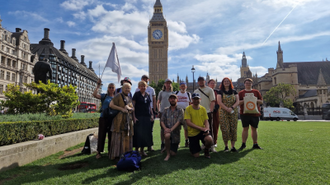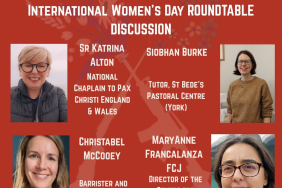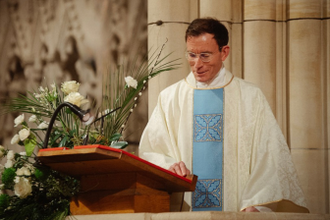Not a peace march a pilgrimage

Recent events in the Middle East have sparked waves of peace marches and vigils in cities across the world. While the majority pass quietly without disturbance and go under the radar, those which arouse controversy tend to hit the headlines. Even before the onset of the Israeli-Hamas War, media reporting of noisy climate action rallies, disruptive Stop Oil campaigns and other fury-fuelled protests have provided the impression that we live in angry times. Given this kind of publicity, the Peace Pilgrimage I joined earlier this year was not what I was expecting.
The six-day ecumenical Peace Pilgrimage from Oxford to the EXCEL Centre in London for the DSEI arms fair in September had been described in the media as a 'protest'. Its promotional poster endorsed this idea, featuring a giant, black, army-style boot stamped across an orange background and the word 'Peace' in stark, red, square lettering. Organised by the Christian campaigning group, Faith Justice, the event cried out 'protest', 'march', 'activism', and conjured up in my mind - naively as it turned out - an angry crowd of vocal, placard-waving agitators.
My expectations were overturned the moment I arrived at Oxford's Quaker Meeting House for the start of the pilgrimage. Far from a large crowd of enraged protestors, my fellow walkers turned out to be seven quietly spoken and, at first sight, relatively unassuming, people.
More surprisingly, there were no banners, no flags, no leaflets. As we made our way unobtrusively through Oxford town centre, then along the Thames and out into the Oxfordshire countryside, there was nothing to distinguish us from other walkers similarly kitted out in hiking boots and shouldering daypacks.
Despite this low-key approach, my fellow pilgrims were evidently seasoned activists. Conversations along the way revealed that one had been involved in protests against HS2, one had narrowly escaped a criminal conviction, and another had been on an Aldermaston Peace March. The HS2 activist took a wry look at the security fencing around a construction site we passed, giving his professional opinion that it would be all too easy to breach.
For someone relatively new to the art of political activism, such snippets of information gave a little frisson to the day's walk. However, it soon became clear that the pilgrimage was less a form of public dissent and more a reflective walk, a gathering of likeminded individuals travelling together in quiet solidarity. Litter was picked up on the way, trees were hugged, and an hour was given to silent reflection about war and peace as, ironically, a chinook helicopter from a nearby airbase repeatedly circled overhead.
As a campaigning tactic, 'peace marches' are perhaps more familiar to the public than peace pilgrimages. The participants of the September event, however, were keen to emphasise that this wasn't a 'march' with militaristic connotations which, as one pilgrim pointed out, often spills over into anger. In the words of another walker, pilgrimage is 'the ultimate act of peacefulness, of quiet, calm and stillness … a time of retreat.'
I rejoined the pilgrimage a week later for the final day. Having reached Westminster, the group had doubled in size. There were a few innovations. Adam, a liberal arts student from Southampton, had removed his shoes and was walking barefoot to demonstrate his 'commitment to the cause', and several pilgrims had attached canvas bags to their daypacks bearing appropriate slogans. One spelled 'EXCEL' incorrectly.
Our pilgrimage initially wound its way along the streets of Westminster, halting at the offices of four companies involved in the arms trade. Outside each, we formed a circle to pray, reflect, and quietly sing a peace song. Unsurprisingly, our presence attracted the attention of security guards. We were asked to move away from the entrance of one building, and obligingly shuffled along the pavement to a less intrusive position.
Given the understated nature of the pilgrimage, I wondered what the pilgrims were hoping to achieve. Pilgrimage is often said to be a 'transformative journey', but none of the pilgrims were under the illusion that their endeavour would bring about peace or change the government's support of the arms trade.
And yet, this wasn't the point. Over the short time I spent with them, I came to realise that this committed group of activists were travelling an internal journey as much as an external one. As explained by Adam, 'Pilgrimage transforms oneself so one can transform the world outside.'
Finally, we arrived at the designated meeting place for those taking part in the climax of the pilgrimage: an hour's silent vigil. Other activists were arriving, greeting one another, and standing around in small groups with banners and flags, chatting quietly. It was all very sociable, low-key and, yes, peaceable.
A lady bearing a green tabard identifying her as a 'Legal Advisor' was handing out cards so I took one. They turned out to be printed instructions on what to do in the event of arrest. 'Not that you'd need it,' she said reassuringly. 'But just in case.'
At a quarter to seven, the assembled group - now about 170 of us - began moving off. As we filtered out onto the quiet approach road to the EXCEL Centre, an eerie hush descended. Silently, solemnly, slowly, and with all the gravitas of a well-rehearsed funeral march, the procession made its way along the pavement, banners fluttering in the evening breeze.
We halted at the western gate of the EXCEL Centre, and I caught my first sight of our destination through the heavy-duty wire meshing. Set well back, its glass pyramid entrance fronted by a wide sweep of steps and a generous number of strategically positioned security guards, it resembled something from a 1960s futuristic film set.
We made a semi-circle around the perimeter fence, now festooned with Quaker and Pax Christi banners and the giant, although slightly ambiguous, message, 'War Starts Here'. A handful of uniformed police hovered discreetly in the background. People began to settle down, sitting cross-legged, kneeling, or standing. Many had candles. After a couple of speeches, partially drowned out by the roar of commercial aircraft overhead, the silent vigil began.
I waited a few more minutes and then left. It wasn't my protest; these weren't my people. And, yet, at the same time, it was and they were. As is so often the case with pilgrimage, time spent with fellow travellers creates a bond and a sense of 'communitas', to use a term coined by the cultural anthropologist Victor Turner.
As I took a last look at my pilgrim companions sitting cross-legged, heads bowed in concentration, nursing flickering candles in the dwindling light of an early September evening, I felt a pang of loss knowing that these strangers-yet-friends would be continuing their journeys without me.
And like so many of the other pilgrimages I'd been on, I left with a treasured memento. In this case it was a plain card inscribed with the words, 'Advice on Arrest'. It now stands among my other pilgrim souvenirs: the holy water bottles, the pilgrim badges, my Camino shell, and my glow-in-the-dark Virgin Mary from Lourdes. Pilgrimage, like Christian activism, takes many forms and occasionally throws up some rich experiences and unforgettable surprises.
Protests against international arms fairs held in the UK continue, with events planned in the next few days to coincide with the International Armed Vehicles event taking place in Twickenham Stadium 22-25 January. More details can be found here: www.indcatholicnews.com/news/48933
Dr Anne E Bailey, Faculty of History, University of Oxford
https://oxford.academia.edu/AnneBailey
https://twitter.com/AnneEBailey1


















